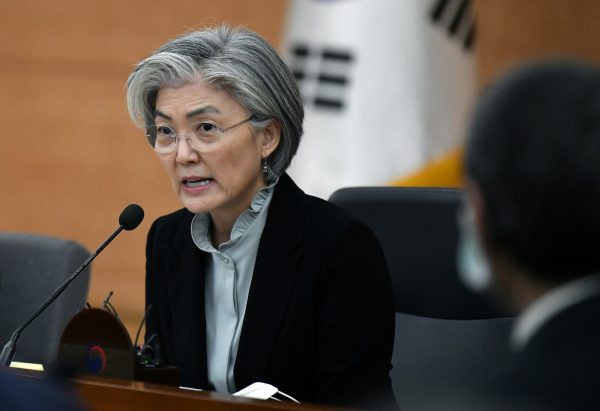Her appointment in 2017 was not the first time Kang had broken a glass ceiling. In 2005, she became the second woman to serve at the director-level in the Ministry of Foreign Affairs. Kang also reached new heights at the United Nations, where she held key posts for over ten years. Her appointment as deputy high commissioner for the UN Human Rights Office in 2006 marked the first time a South Korean woman held such a high-level role at the United Nations.
Kang’s background set her apart from the ‘old boys club’ of South Korean diplomacy in another way — she was also the first foreign minister to never take the foreign service exam, a notable anomaly in a field where highly competitive exams are typically the gatekeeper to public service positions. Her background in multilateral diplomacy is also unconventional, as most of her predecessors — and her successor — have had more North Korea or US-centric expertise.
Conventional or not, Kang’s expertise made her the ideal person to be at the helm of South Korean diplomacy during the COVID-19 pandemic. At a time when some of the world’s greatest powers are looking inward and shunning cooperation, South Korea stands out as an engaged global partner and leader. Kang’s leadership in positioning South Korea as a responsible international stakeholder during this crisis will prove to be one of her most defining achievements as foreign minister.
Despite her obvious skill and successes, Kang’s non-traditional background sometimes drew negative attention, especially amid suspicions that the foreign ministry was bypassed in important negotiations and decisions. But Kang’s atypical path may also be one reason she was able achieve so much success — in the United Nations, where there is greater gender parity, Kang likely faced an environment where women’s contributions were rewarded more frequently.
Traditional paths to leadership have certainly not served South Korean women well in the past, and that’s not for a lack of women in public service. By 2003, South Korea was easily meeting its mandate that 30 per cent of new hires in all government departments be women, so much so that it revised the mandate to apply the quota to men as well. And in 2018, women made up 50 per cent of civil servants for the first time.
Still, South Korean women occupy few public leadership positions, particularly in diplomacy — female ambassadors consistently number in the single digits, and as recently as 2014 there were no female ambassadors.
The Moon Jae-in administration set out with aspirations to address gender equality and parity. Kang was one of four women appointed to Moon’s cabinet, the highest number of women to ever serve in cabinet-level positions simultaneously. Moon also appointed Pi Woo-jin to be the first female Minister of Patriots and Veteran Affairs, one of six non-cabinet minister positions.
Though this was a historic milestone, it fell short of Moon’s stated goal to appoint a cabinet of at least 30 per cent women. Four years into his five-year term, Moon has yet to reach that threshold, and the number of women in his administration has decreased. With Kang’s departure, just three cabinet positions are currently held by women, making it just 16 per cent female.
Despite Moon’s recent lack of concern for gender parity in his cabinet, other gains for women in South Korea cannot be discounted. In addition to the first female foreign minister, Moon also appointed the first women to lead three other ministries — Trade, Labor and Employment; Land, Infrastructure and Transport; and Patriots and Veterans Affairs. South Korean women also made major strides in electoral politics. The 2018 National Assembly election saw a record 57 women elected to parliament, accounting for 19 per cent of the 300 total seats. The ballot also included a feminist party, the Women’s Party, for the first time.
Still, these sorts of gains do not always stick, and a higher number of women in leadership positions does not necessarily equate to more power for women. Though women make up a greater share of public servants than 20 years ago, South Korea — like most countries — has a long way to go before women in government leadership becomes the norm rather than the exception. Kang’s service as foreign minister brings South Korea a step closer to achieving that reality.
Kathryn Botto is a Senior Research Analyst in the Asia Program at the Carnegie Endowment for International Peace.


Thanks for an informative piece. I wonder if she has any plans for the future? While she is of retirement age for most people, many with her talent and life experiences would continue to work. Something in diplomacy, consulting, or teaching?